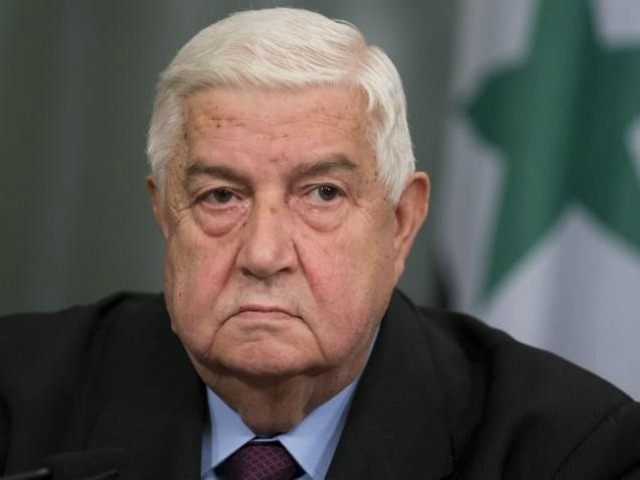Syrian Foreign Minister Walid al-Muallem will meet with Indian Prime Minister Narendra Modi and other high-ranking Indian officials on Monday in a renewed effort to garner international support for the dictatorship of Syrian leader Bashar al-Assad, particularly in Asia.
Muallem’s visit to India arrives two weeks after his departure to Beijing, where he was also seeking support for the Assad regime in the face of upcoming multilateral talks intended to find a political solution to the five-year-old civil war in Syria. Analysts tell Bloomberg that Assad’s pivot to Asia is a direct response to both India’s and China’s public statements opposing a sudden removal of Assad from power that could create a power vacuum easily exploitable by jihadist groups like the Islamic State (ISIS/ISIL/IS). Both India and China have sizable Muslim populations, and China, in particular, has protested that the Islamic State has begun actively recruiting its nationals.
Kanchi Gupta, a West Asia expert at the New Delhi-based Observer Research Foundation, tells Bloomberg:
India and China have similar positions that are implicitly favorable to the Syrian regime in that they both oppose regime change by force. … Their positions on the conflict would be watched carefully by the West and the Gulf, and thus Syria sees greater merit in lobbying them.
Others believe Muallem’s visit to India itself is proof that Indian officials have chosen a side. “The fact that the Syrian foreign minister is visiting India is a clear indication that India supports and has given legitimacy to the Assad government,” former Indian ambassador Ranjit Gupta tells Ahram news. Indian officials have previously described their position towards Assad as similar to that of Russia, Assad’s most vocal and prominent international ally. “I think we are on the same page. … At a conceptual level, both Russians and we agree that the Syrian issue needs to be resolved through political and diplomatic means, and an intra-Syria solution,” S. Jaishankar, India’s foreign secretary, said of the situation in December. India and Russia maintain warm diplomatic relations.
Citing numerous Indian officials, The Hindu portrays the Muallem visit as not so much a desperate grasp for allies on Syria’s part as a move on India’s part to expand its diplomatic footprint in the Middle East. “India is likely to say it has ‘no interest’ in sending troops to Syria to fight in any of the anti-IS coalitions, but could indicate it is open for a bigger role in the Syrian regional reconciliation in West Asia,” The Hindu reports, noting that Prime Minister Modi is expected to travel to Saudi Arabia soon to discuss the nation’s bilateral ties.
A source described as a “senior official” adds that Syria has attempted to bribe India into helping Assad stay in power. “Syrians have offered oil fields to India. India is interested but the security situation is difficult. But India would prefer to purchase oil fields from Syria now and keep them frozen for future use,” the source tells The Hindu.
Syria’s attempts to woo more international actors into the fray come before officially scheduled peace talks in Geneva, in which Syrian officials have expressed an interest in participating. Muallem told reporters during his visit to China that Syria was “ready to participate in Syria dialogue in Geneva without any foreign interference,” present company apparently not included. This week, Muallem told a UN envoy that Syria would bow out of talks if “terrorists,”–a Syrian government term typically meaning any Syrian who opposes Assad’s rule–were involved.
Unlike India, whose officials have repeatedly denied an interest in mediating the Syrian civil war, Beijing has made clear its interest in taking on a larger, but non-military, role in Syria. “China is willing to play a constructive role in pushing for a political solution for the Syrian crisis,” a December column in the state-run People’s Daily declared:
China’s recent invitations for a Syrian government representative and opposition party representative for talks show not only China’s willingness to promote peace talks and a resolution of the crisis, but also China’s commitment to its responsibilities as a major power.
Chinese Foreign Minister Wang Yi has previously stated that “China has no self-interest in the Middle East, so China is willing to play a constructive role, on a fair and objective stance, in finding a political solution to hot spot issues.”
Beijing welcomed the head of the Syrian National Coalition (SNC), a major opposition group, last week, who was visiting to discuss the upcoming peace talks.

COMMENTS
Please let us know if you're having issues with commenting.